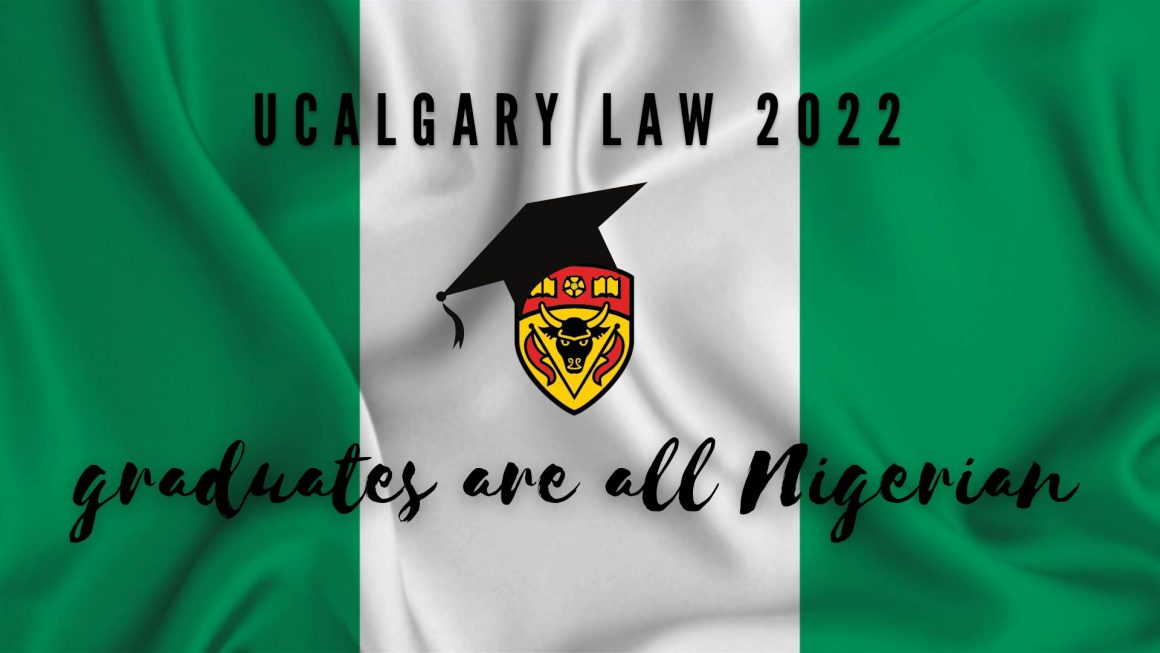
All U of C Master of Laws graduates are Nigerian this year
By Julieanne Acosta, June 29 2022—
The commencement of the 2022 Master of Laws (LLM) graduates held its own special significance for many as the whole class consisted of Nigerian students.
The Dean of Law, Dr. Ian Holloway and Associate Dean, Lyndsay Campbell expressed their congratulatory messages to the graduating class in a statement to the Gauntlet.
“While we’ve had a significant number of Nigerians in our program, we’ve never had this many students all graduate at once. Nor have we had the whole class be Nigerian or African, for that matter,” Holloway wrote in the statement.
“We hope and believe that the successes of our Nigerian students reflect well on the inclusivity of the faculty, which aims to provide a stimulating and supportive academic environment for all of our students, domestic and international alike,” Campbell continued. “Although our LLM students as a whole have various interests, this most recent cohort of graduates all did their research on how law and legal policy could be used to improve human and animal life on land and sea, recognizing humans’ need for energy and the importance of addressing environmental issues in ways that bring justice to people, especially communities that bear the brunt of energy production. We are especially proud of them for what they seek to achieve through and with their educations.”
In conversations with the Gauntlet, 2022 graduate Olaitan Oyekunle and assistant professor Dr. Gideon Christian touched on their own personal sentiments regarding this occasion.
“We crossed many hurdles to be here today. When many of us got our admission letter, it was during the peak of the pandemic; because of the travel restrictions then, we had to start our classes online from Nigeria,” said Oyenkunle. “This was particularly challenging because of the time difference. I recollect taking classes at 1 a.m. and 2 a.m. and having to set for work at 5 a.m. just to beat the notorious traffic in Lagos, Nigeria where most of us worked.”
As Campbell noted, the most recent group of graduates focused on environmental issues as a means to bring justice. Oyenkunle notes his own research, The Right to a Healthy Environment: The Politics of Climate Change and Environmental Justice in Canada, and why he chose to pursue it.
“I have witnessed firsthand, environmental justice issues faced by oil-producing communities in Nigeria. This experience made me pursue my research topic in order to examine some of the salient issues of climate change and environmental justice globally and in Canada; with a view to drawing lessons for Nigeria,” said Oyenkunle. “Climate change impacts vulnerable communities by denying rights to life and personal security, the use and enjoyment of property, the preservation of health, the advantages of culture, education, and food production rights. Even though Canada is yet to recognize climate change as a human rights issue, I made meaningful suggestions for the establishment of a right to a healthy environment in Canada.”
Christian — a graduate of the University of Lagos in Nigeria — expressed his own excitement about this occasion and what it means for the U of C.
“It was an amazing feeling that caught me unexpectedly. As much as I knew the students, and everyone knew they were all graduating on that occasion I never knew that all the graduating students on this occasion were Nigerians,” said Christian. “It’s a joyous occasion for me, as a professor in the faculty, but more so as a Nigerian who went through the same process of education. I felt very happy for them that they were able to start [and finish] the program. The U of C Faculty of Law has been home to generations of Nigerian energy law experts and will continue to be.”
To learn more about the U of C’s Faculty of Law, visit the U of C website.
